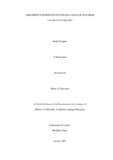
Please use this identifier to cite or link to this item:
https://hdl.handle.net/20.500.14301/119| Title: | ASSESSMENT EXPERIENCES OF ENGLISH LANGUAGE TEACHERS: A NARRATIVE INQUIRY |
| Authors: | Neupane, Sudip |
| Citation: | Neupane,S.(2021) Experiences of English language teachers: A narrative inquiry. |
| Issue Date: | Jan-2021 |
| Publisher: | Kathmandu University School of Education |
| School: | SOED |
| Department: | DOLE |
| Level: | M.Phil. |
| Abstract: | Learning, teaching, and assessment are inseparable components of formal education. Assessment is needed before, while, and after the completion of the course or subject matter to evaluate whether the objectives mentioned in the curriculum are achieved. An assessment helps not only to know about the students’ knowledge and understanding of the content area but also to explore the effectiveness of entire academic activities. Therefore, teaching and learning activities should not be controlled by assessment rather they should support each other. Teaching ought to support assessment and encourage learners for their better learning. However, it is realized that our teaching and learning activities are guided by our own assessment practices. Assessment needs to be taken as a part of teaching and learning rather than only a tool to measure and upgrade the students. Realizing this fact, I carried out this study to explore the secondary level English language teachers’ experiences on assessment practices in Nepal. This study, using a narrative inquiry under the qualitative research method, explored the English language teachers’ experiences on assessment practices in Kathmandu Valley and outside. However, all the participants had some years of teaching experience of English in Kathmandu Valley. This study emphasized the experiences and stories of English language teachers to explore how their assessment practices influence themselves and their learners as well. Specifically, the study explored how English language teachers generated the meaning of prevalent assessment practices and narrated their experience of assessing their learners’ English proficiency. The information for this study was collected primarily via interviews. The open-ended probing questions were asked to explore their experiences and stories. English language teachers were involved as research participants of the study. The findings of the study revealed that the assessment is prominent for the learners’ overall development and the professional growth of teachers as well. The summative assessment is found to be a daring task and focuses on the testing of language contents. In other words, the summative assessment focuses more on theoretical aspects of language whereas formative assessment balances the theoretical and practical aspects of the language. Thus, both assessment practices seem to be the best for language learning and its assessment. Finally, the findings of the study suggest that teaching and learning become effective through the accurate application of assessment strategies in English language classrooms. |
| URI: | http://101.251.6.110:8080/handle/20.500.14301/119 |
| Appears in Collections: | Dissertation |
Files in This Item:
| File | Description | Size | Format | |
|---|---|---|---|---|
| Sudip Neupane_Final Thesis.pdf | 1.06 MB | Adobe PDF |  View/Open |
Items in DSpace are protected by copyright, with all rights reserved, unless otherwise indicated.